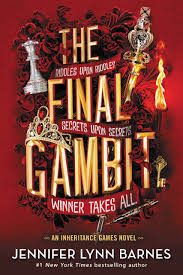
The Final Gambit (The Inheritance Games)
CHAPTER 3
by Barnes, Jennifer LynnThe chapter opens with the protagonist reflecting on the chaotic weeks spent juggling charity events, school exams, and unanswered calls from Grayson. Amidst this turmoil, they find solace in honing their shooting skills at the Hawthorne estate’s private range. Though uncomfortable with firearms, the protagonist recognizes the necessity of self-defense after surviving multiple life-threatening situations since inheriting Tobias Hawthorne’s fortune. Nash, their mentor, praises their progress, highlighting the shift from vulnerability to empowerment through combat training.
The narrative delves into the psychological toll of the protagonist’s newfound wealth and danger. Despite the estate’s security, past experiences of being shot at, nearly blown up, and kidnapped have left lasting trauma. Practical skills like shooting and carrying a knife offer more reassurance than theoretical safety. This pragmatism is reinforced by Nash’s philosophy: survival justifies any means. The protagonist’s internal conflict between fear and resilience underscores their complex adaptation to a perilous new reality.
A significant subplot emerges as Nash inquires about legal paperwork regarding the inheritance. The protagonist recalls their lawyer, Alisa Ortega (Nash’s ex), suggesting a revocable trust to manage the fortune until they’re ready. Alisa’s firm offers to act as trustees, framing it as a protective measure rather than a restriction. This conversation reveals the underlying tensions between autonomy and guidance, as well as Nash’s lingering connection to Alisa, which he masks with casual interrogation about the trust.
The chapter concludes with Nash reinforcing his survival ethos, asking the protagonist to reiterate their “no rules in winning” mantra. This exchange cements their mentor-student dynamic while subtly addressing Nash’s personal stake in Alisa’s advice. The protagonist’s compliance signals their growing alignment with Nash’s ruthless practicality, setting the stage for future confrontations—both physical and strategic—in their high-stakes world.
FAQs
1. What are two reasons the protagonist is practicing at the shooting range, despite not being “a gun person”?
Answer:
The protagonist is practicing at the shooting range for both practical and psychological reasons. Practically, they’ve experienced dangerous situations since inheriting Tobias Hawthorne’s fortune—being shot at, nearly blown up, and kidnapped—and want to be prepared for future threats (Chapter 3, paragraph 5). Psychologically, Nash’s combat training has helped alleviate their nightmares, suggesting the practice provides emotional security beyond just physical defense (Chapter 3, paragraph 5). The Hawthorne estate’s security can’t fully erase their trauma, making self-reliance crucial.2. Analyze the significance of Nash’s question: “What’s our rule about fightin’ dirty?” How does this reflect the chapter’s themes?
Answer:
Nash’s question underscores the chapter’s themes of survival and pragmatism in high-stakes situations. His rule—”There’s no such thing as fighting dirty if you win”—mirrors the protagonist’s approach to their newfound vulnerability. Just as they reject theoretical safety (“Theory hadn’t kept the nightmares away”), Nash rejects idealized notions of fairness when survival is at stake. This philosophy connects to the protagonist’s weapon training and the lawyer’s suggestion of a revocable trust: both are pragmatic tools for navigating a dangerous world where conventional protections have failed.3. How does Alisa Ortega’s proposal for a revocable trust reveal tensions between autonomy and protection?
Answer:
Alisa’s trust proposal presents a paradox: it would grant the protagonist access to the Hawthorne fortune while technically placing control in the lawyers’ hands. Her framing—”minimize the pressure until you’re ready”—implies the protagonist isn’t yet capable of full financial management, despite Tobias Hawthorne’s direct bequest (Chapter 3, paragraph 6). This creates tension between the protagonist’s legal right to autonomy and others’ perceptions of their preparedness. Nash’s subtle skepticism (“Your lawyer bring you that paperwork yet?”) hints this may be a power play disguised as protection.4. Compare the protagonist’s relationship with Nash versus Grayson based on this chapter. What do these dynamics suggest about their support systems?
Answer:
Nash provides active, practical support—training the protagonist in combat and offering blunt advice—while Grayson’s absence (“wondering whether Grayson would ever pick up a damn phone”) signifies emotional distance (Chapter 3, paragraphs 1, 9). Nash’s ex-partner Alisa is the protagonist’s lawyer, creating a complex web of alliances. These dynamics suggest the protagonist’s support system is transactional and survival-focused (Nash) rather than emotionally reliable. The contrast highlights their isolation despite being surrounded by the Hawthorne estate’s resources.
Quotes
1. “Weeks passed in a blur of charity galas and prep school exams, nights talking to Jameson and too much time spent wondering whether Grayson would ever pick up a damn phone.”
This opening line establishes the protagonist’s conflicted state of mind, caught between high-society obligations and personal relationships, while hinting at unresolved tensions with Grayson.
2. “I wasn’t a gun person. This wasn’t my idea of fun. But neither was being defenseless.”
This quote powerfully captures the protagonist’s character growth and pragmatic adaptation to danger, showing how necessity has forced her to develop skills outside her comfort zone.
3. “But since being named in Tobias Hawthorne’s will, I’d been shot at, nearly blown up, and kidnapped. Theory hadn’t kept the nightmares away.”
This reveals the harsh reality behind the Hawthorne inheritance, contrasting the theoretical safety of wealth with the actual dangers the protagonist faces, explaining her defensive preparations.
4. “A revocable trust will simply minimize the pressure on you until you’re ready to fully take the reins.”
This quote exposes the subtle power dynamics at play, showing how legal structures could be used to control the protagonist’s inheritance while appearing to offer protection.
5. “There’s no such thing as fighting dirty if you win.”
This memorable line encapsulates the survival mentality Nash has taught the protagonist, representing a key philosophical shift in how she approaches threats and challenges.
